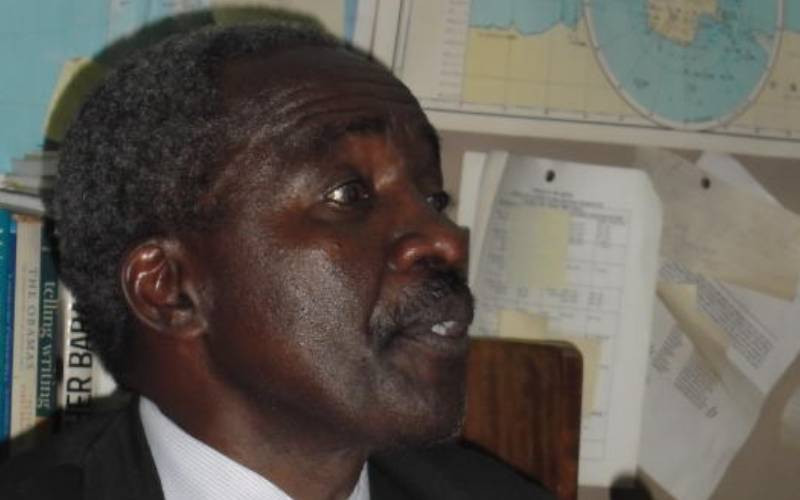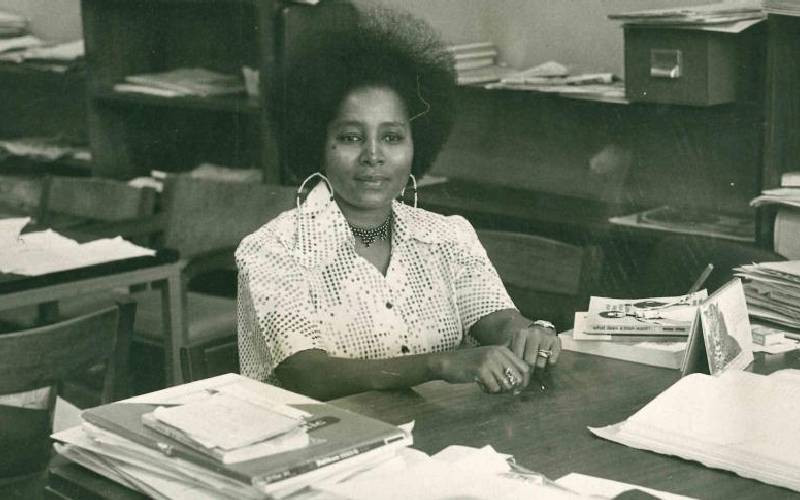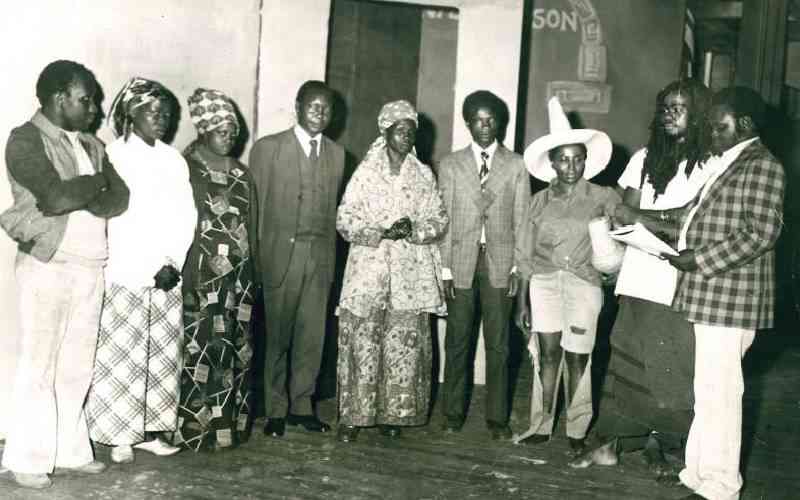
I was rather shocked at those, who, with macabre and morbid glee, agreed with Professor Henry Indangasi's senior room gossip and innuendos, yeasty departmental politics, as fact and thought someone's divorce, depression and choices are good subjects for rigorous scrutiny of one of Kenya's finest writers and academic.
It is hard to understand for whom Professor Indangasi wanted to set the record straight about Professor Micere Mugo. Mugo died at 80, in the US where she was buried on July 29. As many have observed, there is only one motive, but to that, we shall return.
For starters, the good old professor, who I rate highly as a teacher (I daresay, one of the best too), failed to give us a yardstick of what qualifies for deep thinking. Whereas criticism is a valuable, perhaps essential tool in challenging and improving the quality of literary discourse, its practice and exercise can't live and thrive in gossip and personal vendetta. Criticism continued on past its relevance [time and context] becomes unfair, then harmful. I also think that deep thinking requires more than just criticizing others, but also reflecting on one's own assumptions and biases.
Indangasi's speciality in class is 'Stylistics' where he does a good job. In storytelling, gossiping is a good style to employ, but as a yardstick for measuring someone's intellectual output, personal affairs, or indiscretions, insofar as they don't interfere with someone's scholarly commitment, should be left alone.
It will be extremely unprofessional to bring the good old professor's personal affairs to the public arena, worse off, after his death, God forbid, when we can remember him for the great things he did as a teacher.
Micere Mugo is not the first woman whose divorce or personal affairs have been used (usually by men) to tarnish their service and legacy to humanity. We were here with Prof. Wangari Maathai. There was also Winnie Mandela, men who cannot even go to a political demonstration had the nerve to tarnish her legacy. And it is easy to see why a good number of those who took Indangasi's side were men, and their main interest was the innuendos about Mugabe and hosting male students for intellectual debates in her house. Hold on about his dismissal of young men on account of their hairstyle for a moment.
Those familiar with the landscape of the 1980s know for sure that Micere Mugo would never have survived the pettiness of political mandarins then. Writers, academicians who leaned towards Marxism, and anyone the Special Branch taught was a threat spent a few days at the Nyayo torture chambers. To argue that she came from privilege and had no motive to be an 'activist' rings hollow. Many privileged people, including a son of a former vice president, and future presidential candidates like Matiba (who had also served as a minister) served time in prison. As an outspoken critic, Micere would only survive in exile. An affair or no affair, she wasn't built to side with a kleptocratic, repressive regime.

That Indangasi chose to work with the system was a political choice he made and paid a price for, same way, Micere made a political choice to settle away from Kenya. Exile and asylum business are never straightforward, but in the late 1980s and 1990s, the brain drain (really haemorrhage) from Kenya was massive and Micere was part of the coterie of mostly Luo and Kikuyu academicians who left the country and the level of intellectual output in the country after they left was regrettably so low. Compared to the productivity of the Ngugi and Micere period in their time at the university, the 1990s were a dead period in Kenya. And for a reason.
Indangasi, himself an expert in Russian literature that he taught heavy hitters like Wahome Mutahi, probably had to drop teaching Russian literature since the regime didn't appreciate anything with a Communist hue. He went back to teach safe topics, Stylistics, for which I believe he would have been even a greater expert and authority, penned so many books on criticism. I remember the frustrations we had as students after being taught by him, only to realise he had never written a book with deep intellectual perspectives for us to read. That is why it was a bit rich to call a known poet, essayist, playwright, thinker, and philosopher intellectually shallow. The irony of it stunk to the high heavens.
This is not a hagiography for Micere Mugo. There have been other accusations worth intellectual scrutiny and probity, such as xenophobia (towards Ugandan exiles, notably John Ruganda), or tribalism (the convenient silence that most Kikuyu activists of the 1980s during the Kibaki and Kenyatta II regimes). It is fine to look back and see the sustainability of their ideals from the 1970s. But more importantly, to place the argument within the post and neo-colonial framework that inspired them.
Over the years, Micere was an outspoken ambassador of the African philosophy of Ubuntu, which she further developed into the "onion structure theory" about how inextricably intertwined the human race is. That we are human first and everything else follows. And those of us offended by the good old professor were crying out loud for decency, and respect for the dead (more so where the dead always carried themselves with class and dignity and whatever failings they had as humans - at least from 40-odd years - ago, shouldn't be used to for cheap scoring of points).
But what inspired Indangasi?
As many have said, it is the green monster: envy. The incurable type. That is why he likes sparring with the dead who cannot defend themselves. Which is disingenuous, unmanly, and unsportsmanlike. He came for Achebe, remember?
It seems, there is a man Indangasi wanted to be: a great writer or a world-renowned literary critic. He had the intellectual mettle to achieve this. However, he boxed himself into a corner. All the thinkers of his generation built their academic niche around post and neo-colonial studies. However, Indangasi was of a different view. Where Achebe and Edward Said could see the racism in Joseph Conrad's books, Indangasi could only care about the beautiful writing.

Where Ngugi wa Thiong'o and Micere Mugo focused on the legacy of colonialism in Kenya, Indangasi prefers an apolitical stance to literature. He believes good literature transcends politics and any transient zeitgeist (say HIV or Covid pandemic). Shakespeare and a few Russian texts are the yardsticks of what should be considered Literature. This is not only sad but hollow. You can't separate life and politics. You can argue for a case of books that appeal to universal human cravings, but to dismiss works inspired by the politics of the moment is to live in fantasy.
And thus, Achebe, Ngugi, Micere, Meja Mwangi, and Wole Soyinka went on to write books, some became professors, and not necessarily through the conventional route that Indangasi obtained his first class. There have been outstanding and productive literary critics and nonfiction writers such as Benrth Lindfors, Simon Gikandi, and some of his students who have done wonders in the academy. These writers achieved not only fame, widespread acceptance, and standing against bad dictatorships, they ended on the right side of history, even when they were not necessarily right.
Indangasi supported the political big man of the day for his own reasons and ended up being ostracised and one can see why he can't believe that in the end, maybe the only thing we will remember him for outside the classroom, is not an outstanding book of or with intellectual depth, but a gossipy tirade targeting a dead former colleague. Someone bring back shame.
Lastly, you saw the contempt the good old professor showed those young men who purportedly spent time at Mugo's home? Indangasi was famously a gatekeeper while at the university, denied many a young scholar opportunity to advance himself, was not known to have opened a door a crack for others to go study abroad, and generally contributed to the malaise that sometimes afflicts various departments at the university.
Here is to hope that he will be gracious enough to attend the various memorials lined up for Prof. Micere Mugo, maybe contribute a contrarian scrutiny of her intellectual output (not gossip) or retire his pen, while he can.
For if criticism is pursued for its own sake, or valued as the last word, for the one that you criticize is dead and buried, will never have a right of reply, loses its purpose.
 The Standard Group Plc is a multi-media organization with investments in media
platforms spanning newspaper print
operations, television, radio broadcasting, digital and online services. The
Standard Group is recognized as a
leading multi-media house in Kenya with a key influence in matters of national and
international interest.
The Standard Group Plc is a multi-media organization with investments in media
platforms spanning newspaper print
operations, television, radio broadcasting, digital and online services. The
Standard Group is recognized as a
leading multi-media house in Kenya with a key influence in matters of national and
international interest.
